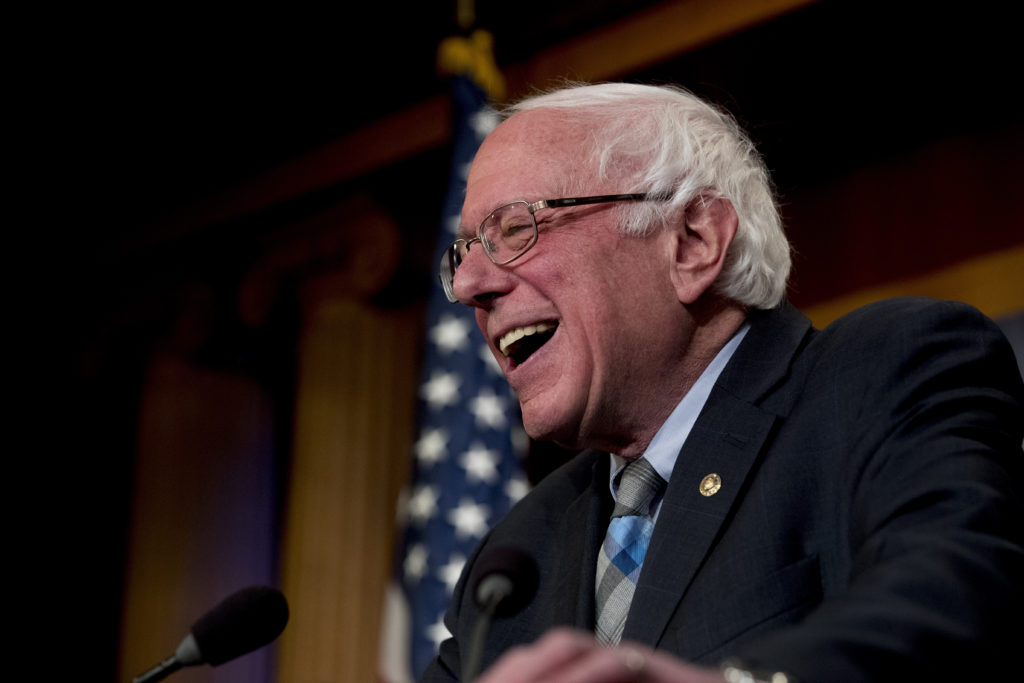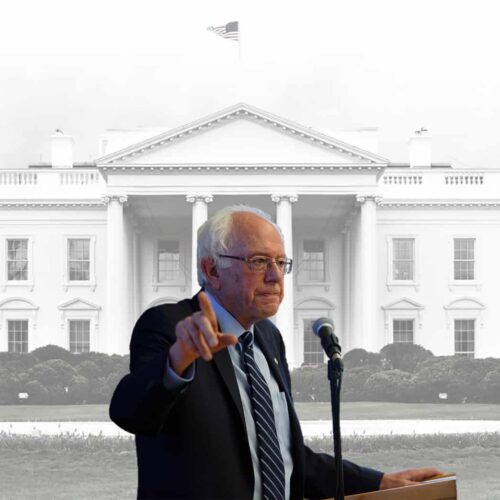This article is published in partnership with VTDigger
Introduction
Update, April 8, 2020: Bernie Sanders has suspended his presidential campaign.
After wowing the Democratic electorate in 2016, Bernie Sanders is back for another White House run.
“What I promise to do is, as I go around the country, is to take the values that all of us in Vermont are proud of — a belief in justice, in community, in grassroots politics, in town meetings — that’s what I’m going to carry all over this country,” Sanders told Vermont Public Radio on Feb. 19. “[T]he current occupant of the White House is an embarrassment to our country.”
This time around, the three-term independent U.S. senator from Vermont — a self-described “democratic socialist” — isn’t a major long shot against an all-but-anointed frontrunner.
Today, he enjoys legions of supporters. And while he notably shuns the “millionaires and billionaires” of big-money politics, his fundraising prowess among small-dollar donors is all but unmatched — Sanders’ 2016 presidential campaign raised about $237 million, many of whom heeded a call to give $27.
Sanders, 77, will nevertheless need every shred of such backing in what’s a decidedly different presidential campaign this year — one already jammed with high-profile senators and some intriguing, if lower-profile hopefuls.
Among them: Rep. Tulsi Gabbard, D-Hawaii, a Sanders acolyte four decades his junior who nominated Sanders for president at the 2016 Democratic National Convention and declared Sanders would “usher in a new era of peace and prosperity.” Gabbard and Sanders are now competitors.
Here’s more on Sanders’ political and financial history:
- Sanders enters the 2020 presidential campaign with significant cash resources on hand. His U.S. Senate campaign committee was flush with $9.1 million from his Senate campaign committee going into 2019, according to a filing with the Federal Election Commission. His separate “Bernie 2016” presidential campaign committee, meanwhile, still had almost $4.7 million going into 2019, FEC records show. By law, Sanders may take money from both accounts to use toward his presidential bid.
- Super PACs — lightly regulated political committees that may raise and spend unlimited amounts of money to support or oppose political candidates — are Sanders scourges. “I do not have a super PAC, and I do not want a super PAC,” he declared to cheers after trouncing Clinton in the 2016 New Hampshire primary. One catch: Sanders can’t control whether super PACs, which are legally separate entities from candidates’ campaign committees, support him. And Sanders indeed received some super PAC support during his 2016 bid, most of it from National Nurses United, which spent almost $4.8 million on pro-Sanders ads and communications.
- One super PAC Sanders certainly couldn’t control was Americans Socially United, a federally registered committee run by self-styled “lobbyist” and “diplomat” Cary Lee Peterson, who convinced “James Bond” actor Daniel Craig to help bankroll his group with nearly $50,000. But the Center for Public Integrity in 2015 revealed that Peterson had a history of business swindles and legal problems and that Americans Socially United was failing to file federally-mandated campaign finance disclosures. The FEC later fined Americans Socially United, but that proved to be the least of Peterson’s troubles. In December, a federal judge sentenced Peterson to 52 months in prison after his conviction last year on unrelated fraud charges.
- In August 2016, shortly after he ended his 2016 presidential bid, Sanders launched Our Revolution, a 501(c)(4) “social welfare” nonprofit organization that says it aims to “revitalize American democracy, empower progressive leaders and elevate the political consciousness.” Our Revolution is overtly political — it’s been openly advocating for Sanders himself to again seek the presidency — and isn’t fully transparent about who funds it. For example, Our Revolution lists the first and last names of its contributors who give $250 or more per year — but that’s it, even for donors who give six figures. It’s difficult to accurately identify donors with only this information. Among Our Revolution’s name-only donors: “Ben Wilson,” “Sarah Brown,” “John Allen” and “Anonymous Anonymous.” Sanders himself has long run his political campaigns on a platform of political transparency. “We actually provide more information on our donors than is legally required,” Our Revolution spokeswoman Diane May told the Center for Public Integrity. “Out of respect for our donors, we do not share the exact contributions and some people do ask to remain anonymous.”
- Sanders’ Our Revolution Group raised about $3.42 million over fewer than five months in existence during 2016, according to a tax return it filed with the Internal Revenue Service in November. Comparatively, it raised just a hair more during all of 2017 — about $3.45 million, records show. Our Revolution states that it will not accept donations of more than $5,000 during one year “unless approved by a majority vote of the board of directors.” But the group disclosed accepting five contributions of more than $5,000 in 2017, including one for $100,000, according to its tax return. (It did not identify the donors.) Overall during 2017, Our Revolution spent $335,464 on “political campaign activity,” the disclosure states. It also gave nearly $243,000 in 2017 to the Standing Rock Sioux Tribe, which has been highly active in both environmental and voting rights activities during the past several years.

- An “international syndicate of cyber-thieves” stole about $242,000 from Our Revolution in December 2016, the group disclosed in November. “Our Revolution worked with the Federal Bureau of Investigation, Our Revolution’s counsel and an independent cyber-security consultant in an effort to identify the thieves and to recover the funds but, unfortunately, these efforts were unsuccessful,” it wrote to the IRS.
- In 2016, Sanders twice asked federal regulators to grant him 45-day extensions for filing a mandatory personal financial disclosure for presidential candidates. The practical implication? Sanders avoided revealing details about his own assets and liabilities in May 2016, when he was still running for president. By the time August 2016 came around and Sanders had extinguished his two extensions, he had dropped out of the 2016 presidential race and declined to file a presidential personal financial disclosure form at all, though he filed a separate, mandatory disclosure with the Senate months later.
- Sanders routinely ranks among the U.S. Senate’s less wealthy members. But the fame Sanders gained from his 2016 presidential campaign also boosted his own bottom line. Sanders’ most recent U.S. Senate personal financial disclosure, filed in May 2018, indicates he in 2017 earned more than $880,000 in royalties stemming mostly from four separate book deals. That amount includes $539.47 in royalties related to the sales of “We Shall Overcome,” Sanders’ 1987 folk music album, which The Guardian concluded is “so bad, it’s good.”
- Sanders has personal debt in the form of two mortgages, according to his latest personal financial disclosure filing. The minimum value of the debt is $350,002 and the maximum value is $750,000. Sanders and his wife, Jane, in 2016 purchased a vacation lake home in western Vermont valued at nearly $600,000.
Sources: Center for Public Integrity reporting, Federal Election Commission, U.S. Senate, Center for Responsive Politics, CNN, Seven Days, Internal Revenue Service, Vermont Public Radio
Read more in Money and Democracy
Money and Democracy
What second-quarter fundraising can tell us about 2020
Presidential campaign finance disclosures help gauge candidate viability and voter enthusiasm.
Money and Democracy
Controversial J&J drug pushed by Trump is nixed from VA’s pharmacy list
Experts question Spravato’s safety and effectiveness.


Join the conversation
Show Comments
His Liberal Socialist Values came out of Junior high School where social conformity and peer pressure are the backbone of what Socialism really is.